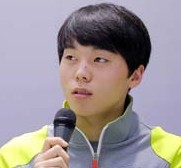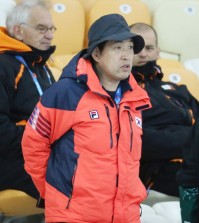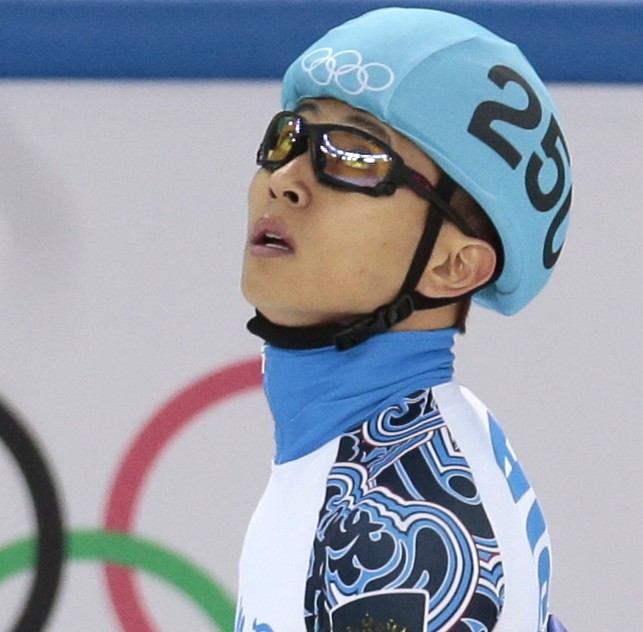- California Assembly OKs highest minimum wage in nation
- S. Korea unveils first graphic cigarette warnings
- US joins with South Korea, Japan in bid to deter North Korea
- LPGA golfer Chun In-gee finally back in action
- S. Korea won’t be top seed in final World Cup qualification round
- US men’s soccer misses 2nd straight Olympics
- US back on track in qualifying with 4-0 win over Guatemala
- High-intensity workout injuries spawn cottage industry
- CDC expands range of Zika mosquitoes into parts of Northeast
- Who knew? ‘The Walking Dead’ is helping families connect
Blessing in disguise
Top skater recovering after surgery to remove bone tumor
Noh Jin-kyu, Korea’s short-track speed skating ace, was devastated after breaking his left shoulder and elbow during practice earlier this month, which shattered his dreams of going for glory at the Sochi Winter Olympics. However, it now looks as if the injury might prove to be the best thing that has ever happened to him.
 In preparing to surgically repair Noh’s left shoulder blade, doctors found a rare form of cancer which starts in the bones. Surgery to remove a tumor on Wednesday went well, according to doctors at Seoul’s Korea Cancer Center hospital, who say that early diagnosis is critical in combating the disease. The 22-year-old will be subject to anti-cancer therapy for six to eight months.
In preparing to surgically repair Noh’s left shoulder blade, doctors found a rare form of cancer which starts in the bones. Surgery to remove a tumor on Wednesday went well, according to doctors at Seoul’s Korea Cancer Center hospital, who say that early diagnosis is critical in combating the disease. The 22-year-old will be subject to anti-cancer therapy for six to eight months.
Actually, Noh’s tumor was first detected in a physical he took after a World Cup event in September. However, doctors concluded at that time it was a benign tumor ― which doesn’t spread to other parts of the body and can often be removed permanently ― and not cancer.
Jeon Dae-geun, the Korea Cancer Center physician who operated on Noh, said that the wrong diagnosis might have had damning consequences.
“The area beneath the left shoulder blade is not a typical part where you find osteosarcoma. It’s also easy to mistake the tumor as an oversized cell tumor, which is benign,’’ Jeon said.
Noh’s tumor, measured at 6 centimeters in length when found last year, had grown to 13 centimeters, which left Jeon suspecting it was malignant.
“The initial tests indicated it was a giant cell tumor, but just to be sure, I examined deeper parts of the shoulder blade area and found the osteosarcoma. It was inevitable that we removed his shoulder blade entirely.’’
Along with Ewing’s sarcoma, osteosarcoma is the most common type of primary bone cancer. These conditions are rare, found in just 15 out of a million people, according to Korean medical experts.
However, they are aggressive types of cancers and survivors often left with significant disabilities. It’s obviously critical for doctors to diagnose and treat the patients early.
Symptoms of bone cancer include painful bones or swollen joints, which can be misdiagnosed as sporting injuries. Noh complained about increasing pain in his left shoulder since late last year, according to his coaches, and had been taking painkillers.
While Noh’s athletic career is no longer a priority, Jeon said he could picture him skating again.
“The recovery rate of this condition, when treated in time, is 60-percent. He won’t have much difficulty in daily life even without a shoulder blade because he will still be able to use his hands and elbow. However, it would be impossible for him to raise the level of his arm above his shoulders,’’ Jeon said.
“If he recovers and adjust to his limitations in motion, he will have a good shot at extending his athletic career. Noh is taking the situation pretty well.’’
Before his injury, Noh, who has five world championship gold medals under his belt, had been considered a gold-medal contender in the men’s 1,500- and 3,000-meter competitions at Sochi. He was also expected to anchor the Korean team in the men’s 5,000-meter relay.
















